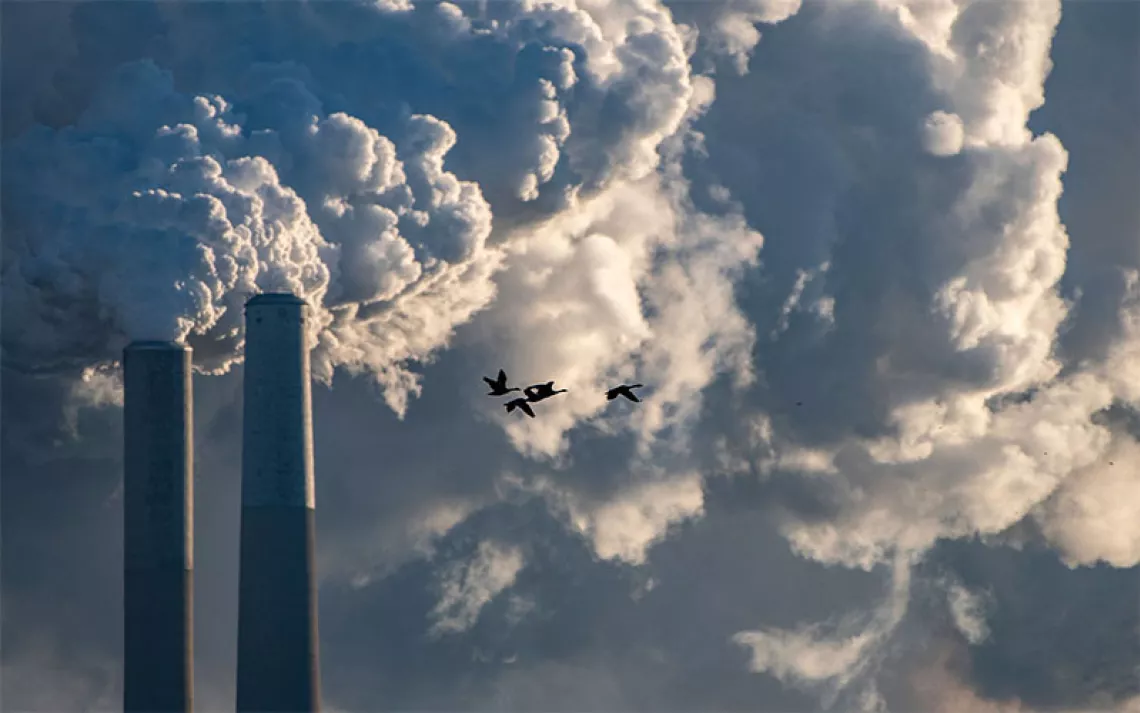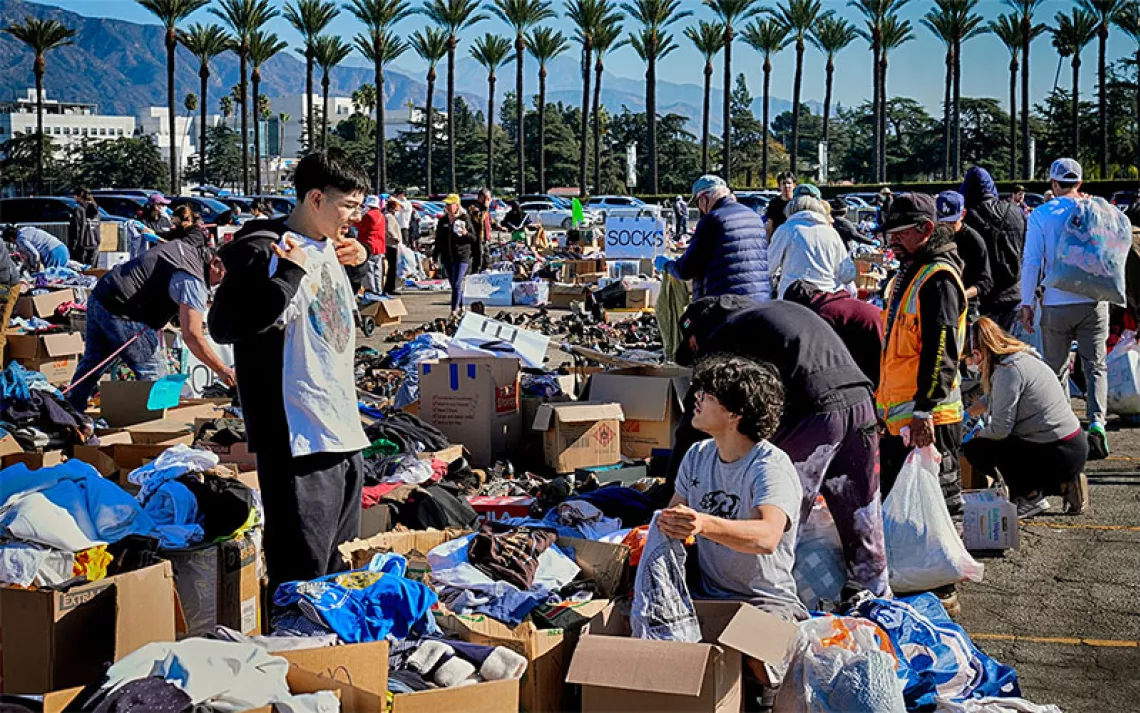Time for Change
An interview with filmmaker Charles Ferguson

Charles Ferguson’s Time to Choose pulls no punches about the perils our planet and humanity face from global warming. But compared to other doom-and-gloom disaster films such as 2004’s The Day After Tomorrow, or Josh Fox’s emotional eco-doc How to Let Go of the World and Love All the Things Climate Can’t Change, Ferguson’s documentary seems positively wonkish. Time to Choose is logical and dispassionate as it meticulously, scientifically lays out the case for how to solve the climate crisis.
The brainy Ferguson majored in mathematics at the University of California at Berkeley, where he received a BA in 1978, later earning his PhD in political science at MIT in 1989. As the internet became more commercialized, he turned what he calls “a good idea for a software product” into the high-tech company Vermeer Technologies, which created the visual website development tool FrontPage (sold to Microsoft for $133 million, reportedly, in 1996).
A lifelong movie buff, Ferguson eventually turned to filmmaking. His first documentary, No End in Sight—about the calamities of the endless Iraq War—scored an Academy Award nomination. Inside Job—a film about how Wall Street malfeasance caused the worst economic catastrophe since the Great Depression—won the 2011 Best Documentary Oscar. His acceptance speech was the finest moment of the Academy Awards ceremony, as Ferguson declared: “Forgive me, I must start by pointing out that three years after our horrific financial crisis caused by financial fraud, not a single financial executive has gone to jail, and that’s wrong.” He went on to write Predator Nation: Corporate Criminals, Political Corruption, and the Hijacking of America (Crown, 2013).
Now, Ferguson has focused his camera—and keen intellect—on climate change and its connection to other inequities. Time to Choose features interviews with scientists, activists, politicians, economists, and others, including climatologist James Hansen, primatologist Dr. Jane Goodall, California governor Jerry Brown, Greenpeace International’s executive director Kumi Naidoo, Nobel Peace Prize-winner Muhammad Yunus, Sierra Club executive director Michael Brune, and urban planner Jaime Lerner. Along with Ferguson’s own insights as he travels the globe, they weave a hopeful tapestry as to how we can halt climate change—and, in the process, reduce economic disparities as we try to save our world.
*
Sierra: On the poster for Time to Choose, there is an hourglass, which suggests we’re running out of time. And of course, the word “time” is in the title of your film. What did you find out while making your film that frightened you most?
Ferguson: Well, that’s kind of hard to say. In very clear descriptions from very intelligent scientists, I learned about how at some point this becomes irreversible. As soon as you get to a certain point, you’re going to lose Greenland, no matter what you do. If you lose Greenland, you lose half of the earth. I also was speaking with Jim Hansen; he told me that it was definite that when temperatures rose there were very, very big storms. . . . He showed me a photograph of a gigantic boulder on top of a hill on some island in the Caribbean. He said, “That boulder is 120,000 years old. It was put there on the top of that hill by a storm—it used to be on the bottom of the ocean.” [Laughs] I think we prefer not to get there.
Sierra: What gave you the most hope?
Ferguson: Well, just seeing how rapidly renewable energy is growing and how many things are going to be quite competitive very soon. I think it already is.
Sierra: What surprised you most?
Ferguson: One thing that surprised me a lot is that the same thing that creates climate change causes many other problems—including immediate current environmental pollution as well as long-term climate change. And I was also surprised how deeply connected the climate problem is to economic inequality. That was something I hadn’t realized. But once you look at it in a comprehensive way, it’s very clear that there’s a very deep and very powerful connection between the two, for many reasons. Probably the single largest one being that the current energy system—and also the current food system to a great degree—are based on control and unsustainable exploitation of natural resources: oil, coal. And so you have this situation all around the world where a small number of people can control an enormous amount of wealth. It just turns into a recipe for political corruption and inequality. So, I was very struck by that. It just never occurred to me that there was such a deep relationship between inequality and the climate problem—but there is.
Sierra: It was just 118 degrees in Phoenix. Lay out the bad news scenario: If we don’t enact some of the changes you advocate in Time to Choose, where are we now? At the precipice of climate change?
Ferguson: Well, I think you answered the question yourself when you pointed out that it was 118 in Phoenix. I was born and raised in San Francisco. And I still live here. If you were raised in California and you’ve been in the state a long time, you know climate change is real. You don’t need scientists to show you. It’s very obvious. Spring comes a month earlier than it used to. It gets much hotter; there’s less rain. There are many more droughts, many more fires. It’s just a literally different climate. And California is having lots of serious problems.
Sierra: Your documentary is very results-oriented. What’s the good news? What can we do to fix climate change?
Ferguson: There’s lots of things. At the personal level, we can change how we eat. Get a hybrid or electric car. Put solar panels on our house. We can live in a place where we can walk or bicycle to work. All kinds of things like that.
And then on the government policy level, obviously, we can tax carbon and stimulate renewable energy and change the agricultural system, so that we grow food differently.
Sierra: In your documentary, you interview Michael Brune, executive director of the Sierra Club. Tell us about that.
Ferguson: I like him a lot. I’m very impressed with the Sierra Club, with what it’s doing and he’s doing. What an amazing guy. He’s very direct about the problem and very practical yet ambitious about what the Sierra Club is doing about it. I spoke with a number of people who work with him on the Beyond Coal campaign, about the efforts by the Sierra Club to stop using coal to generate electricity, among other things.
Sierra: What do you think about the fact that Senator Bernie Sanders appointed [environmentalist and 350.org cofounder] Bill McKibben to the committee that authors the Democratic Party platform?
Ferguson: I think it’s good news. And I think it’s good news that both of the serious Democratic candidates in the primaries believe strongly that climate change is a major problem and one we have to deal with. They’re different, obviously, Hillary Clinton and Bernie Sanders, but they both made it very clear that they take climate very seriously and it needs to be addressed. And they want to expand on things the Obama administration has been doing recently. So I think it’s welcome.
Of course, it would be very scary if we ended up with President Trump, given what he’s said about climate.
Sierra: You won the Oscar for Inside Job, a film about Wall Street crimes. Do you think removing the profit motive from the energy industry and so on will help solve climate change?
Ferguson: No, I don’t think so, actually. The problem is not the profit motive. Renewable energy companies are profit-motivated companies as well. What I think has to be done is that the energy industry has to be regulated much more seriously and in a way that reflects the real economic and environmental costs of producing energy. If that were done, which would include subsidies and a carbon tax, then it would be economically efficient and beneficial for renewable energy to displace fossil fuel emissions. That has to happen.
Sierra: What’s next for you, Charles?
Ferguson: Well, I’m working on several films. Some are policy-oriented subjects, some of them not. I’m not sure which one of the movies will be next. I want to keep making movies.
Time to Choose has been theatrically released. For screening info see: timetochoose.com/screenings.
 The Magazine of The Sierra Club
The Magazine of The Sierra Club



